Think of this as Volume 18, Number 3 of the newsletter I have written weekly since March, 1997. Enjoy.
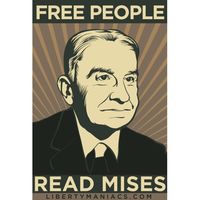
My view is that Austrian economics, like Karl Marx' communism, is faith-based economics. It ignores economic evidence, its acolytes spending all their time rejecting contrary facts.
They explicitly reject the notion that government can weigh evidence of economic strength or weakness and do anything about it. Thus Austrian economics can never fail. It can only be failed by those too weak to apply it rigorously enough.
Austrian economics stands alongside climate denialism and religious millenialism as one of three pillars of the modern conservative movement. This is what makes conservatism a clear and present danger to democracy in our time. It's at the heart of our present crisis.
That's because democracy thrives only in an atmosphere of real give-and-take, where facts are agreed-upon and we engage in a rigorous discussion on dealing with those facts. If people don't accept facts you're left with what the Middle East and Africa face, a dictatorship by either religious oligarchs or financial ones, the latter allied to corrupt militarists who feel forced to stand-in between the people and the modern world in order to maintain their comfortable lifestyles.
In America, it's financial oligarchs who maintain the fictions of Austrianism, of climate denialism, and of religious millenialism. If a bus took out Charles and David Koch tomorrow, and if their heirs decided to withdraw the family from politics, the whole edifice might be crippled, possibly beyond repair. Unless the Wal-Mart heirs chose to stand in the breach. (Note that both the Koch money and Walton money is second-generation money – none of these people did a damn thing to deserve a dime of what they have.)
Having switched from a tech beat to a financial one almost three years ago, I'm having to deal a lot with the Austrians these days. They're Clueless, but since they never have to accept a Clue their cluelessness is evergreen.

His book, “The Great Deformation: The Corruption of Capitalism in America,” is a summary of the Austrian case against both monetarism, which the manipulation of the money supply Ben Bernanke used to get us out of the Great Recession, and the fiscal theories of John Maynard Keynes, which eventually got us out of the Great Depression.
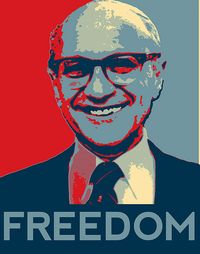
It's one of the great ironies of modern economics that monetarism, whose intellectual father was Milton Friedman, was praised to the skies by the Austrians when it was used to limit the supply of money in the 1960s. Then it was “conservative.” The same policy is now derided as “liberal” because Bernanke, who got many of his cues from Friedman's own studies of the Great Depression, applied it as it was meant to be applied starting in 2008.
Austrians, by contrast, reject any government interference in the markets. Stockman calls such interference “statism.”
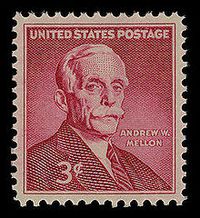
Austrians believe firmly that “the taper,” the removal of Quantitative Easing (QE) due to start this year, will trigger a complete economic meltdown. They insist that Ben Bernanke's past creation of new money, both in the bailout and in QE, can only be unwound through hyperinflation, which will destroy faith in the currency.
They ignore the fact that the U.S. dollar doesn't just exist as a call on the U.S. economy, but that its use as a “reserve currency” means it has a call on the world economy. There just aren't enough Chinese Yuan, or Japanese Yen, or even European Euros around to do this job of greasing global trade, any more than other languages can replace English as the world's default language.
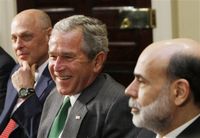
Unfortunately “Helicopter Ben” could not drop money on anyone other than bankers because, as a bank regulator, this was beyond his authority. Dropping money on ordinary people means spending, by the government, on things people need and do. Republicans caused this fiscal policy door to shut, then blamed the Administration for the resulting slow growth.
After accepting a stimulus bill that was only half as big as it needed to be, in Keynsian terms, because the outgoing Bush people had said the 4th quarter 2008 economy was contracting at 4%/year instead of the actual 9%/year, Republicans refused to do anything more. The lack of Keynsian stimulus has kept the recovery modest.
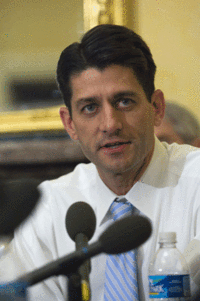
In all this economic sabotage they've been cheered-on by the Austrians, whose “freedom” is just another word for nothing left to lose and whose “peace” is merely militarism that's the peace of the grave.
As a result 2014 should be a key year. If removing the taper leads to economic collapse, if it proves impossible to rein-in the money supply as the strike ends, if we get hyper-inflation and another depression, then the Austrians are right and they may yet get their dictatorship. If it doesn't the Austrians should slink away.
But that's not the way to bet. If proven wrong in 2014, the Austrians will predict doom in 2015, then 2016, until some new recession “proves” them right. That's how ideologues roll.

Despite continuing austerity, despite all the economic sabotage the Austrians have advocated through their economic religion, America is moving forward because that's the kind of people we are. We're the free minds of every country, the best-and-brightest from China, from India, from eastern Europe, Africa and Latin America, all lucky enough to have a chance to do our thing, with the real freedom, real peace and real incentives needed to turn our ideas into a better future.










